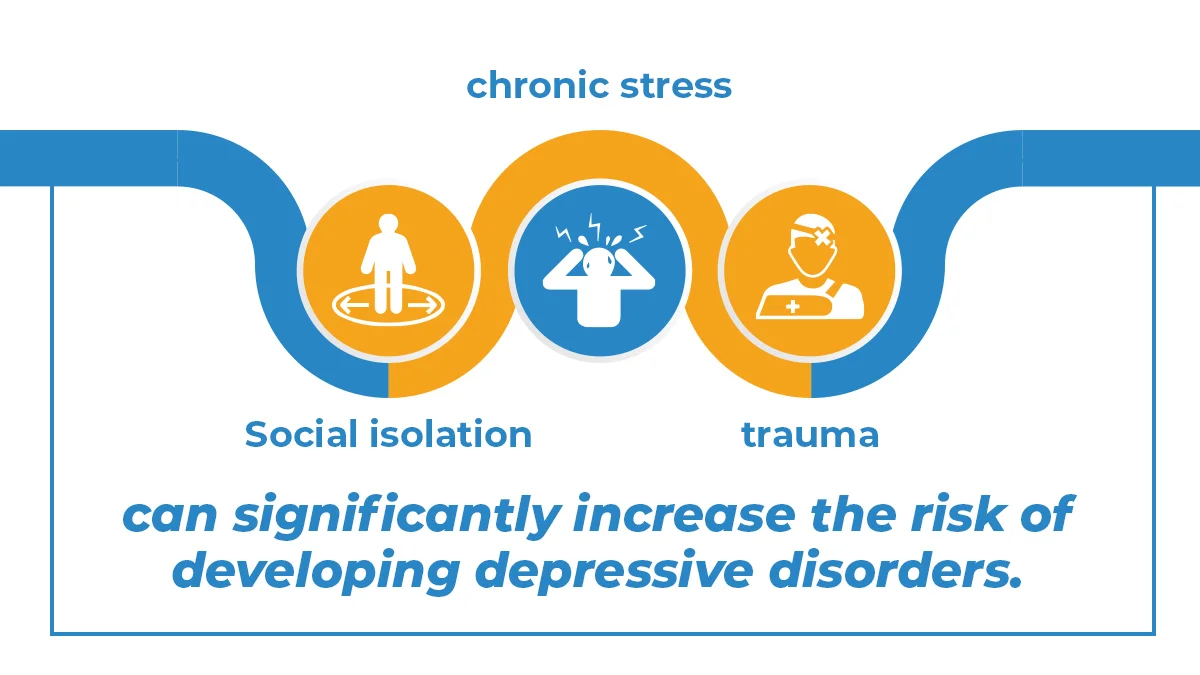What Causes Depression?
Depression is a complex and widespread mental health issue that can have multiple causes. Different factors such as genetics, neurochemical imbalances, life’s hardships, and chronic stress can contribute to its development. It is important to understand these various triggers of depression to provide appropriate treatment and support.
This blog post explores the various causes of depression, revealing the complex network of factors that affect a person’s mental health. By understanding these causes, we can develop effective strategies to alleviate and prevent the significant impact of depression.
Key Takeaways
Depression is a prevalent mental health condition in the United States, affecting a significant portion of the population. Here’s what you need to know:
- Genetic predisposition, life events, and imbalances in brain chemicals contribute to the multifactorial causes of depression.
- Social isolation, chronic stress, and trauma can significantly increase the risk of developing depressive disorders.
- Effective treatment often involves a combination of therapy, medication, and lifestyle changes, emphasizing the importance of a holistic approach to managing depression.
Contact The Recovery Team at (800) 817-1247 for mental health conditions to foster long-term healing and growth.
What Is Depression
Depression is a complex mental health disorder categorized by persistent feelings of sadness, hopelessness, and a lack of interest in daily activities. It goes beyond ordinary mood fluctuations, affecting one’s thoughts, emotions, and physical well-being.
Common symptoms include fatigue, changes in appetite, sleep disturbances, and difficulty concentrating.
It hinders a person’s ability to function optimally, impacting relationships, work responsibilities, and overall quality of life.
Root Causes of Depression
Depression, affecting millions globally, is not a singular phenomenon with a straightforward origin. Its roots intertwine with myriad factors, each significant in its onset and progression. To understand this intricate web, we can categorize the causes of depression into four main domains.
Biological Factors
The biological underpinnings of depression delve into the intricate world of neurochemistry. Imbalances in neurotransmitters, such as dopamine, serotonin, and norepinephrine, are often implicated.
Genetic predisposition or genes can also cast a shadow, as individuals with a family history of depression are more susceptible.
Neuroendocrine factors, including abnormalities in the hypothalamic-pituitary-adrenal (HPA) axis, contribute to the dysregulation of stress hormones. Understanding these biological facets provides a crucial foundation for comprehending the physiological roots of depression.
Psychological Factors
The workings of the mind are equally influential in the genesis of manic depression. Cognitive patterns, shaped by negative thinking and distorted perceptions, can create a fertile ground for depressive episodes.
Low self-esteem, pervasive pessimism, and a sense of hopelessness often characterize the psychological landscape of those grappling with depression.
Past traumatic experiences, especially during formative years, can leave enduring imprints on the psyche, becoming pivotal elements in the development of depressive disorders.
Emotional Factors
Emotions, integral to the human experience, play a crucial role in the tapestry of depression. Chronic stress, grief, and unresolved emotional conflicts can serve as catalysts, triggering or exacerbating depressive symptoms.
Difficulties in emotional regulation, where individuals struggle to manage and express their feelings, contribute to the emotional turmoil associated with major depression. The inability to navigate these turbulent waters effectively can lead to a deepening sense of gloom and hopelessness.
Environmental Factors
External forces in the environment wield considerable influence over mental health, and depression is no exception. Socioeconomic factors, such as financial strain and job insecurity, can act as stressors, amplifying the greater risk of depression.
Social isolation, a modern-day epidemic exacerbated by digital disconnection, further compounds the issue. Traumatic events, ranging from the loss of a family member to interpersonal conflicts, create ripples that resonate within the individual, shaping the emotional and psychological terrain in ways that may precipitate depression.
Effective Approaches to Treat Depression
Managing and preventing depression involves a multi-faceted approach that addresses various aspects of life, including physical, emotional, and social well-being.
Here’s a list of effective treatment strategies to overcome depression:
Psychotherapy (Talk Therapy)
Psychotherapy, commonly recognized as talk therapy, is a cornerstone in the treatment of depression. Different modalities, such as cognitive-behavioral therapy (CBT), interpersonal therapy (IPT), and psychodynamic therapy, offer individuals a platform to explore their thoughts, emotions, and behaviors.
CBT, for instance, helps identify and challenge negative thought patterns, fostering more constructive thinking. IPT focuses on improving interpersonal relationships, while psychodynamic therapy explores unconscious influences on behavior.
Psychotherapy offers a safe space for people to express their feelings, gain insight into their struggles, and develop coping strategies to navigate mental health disorders.
Medication
Medication is another crucial component of depression treatment, especially for individuals with moderate to severe symptoms. Antidepressants, such as selective serotonin reuptake inhibitors (SSRIs), serotonin-norepinephrine reuptake inhibitors (SNRIs), and tricyclic antidepressants, work by balancing neurotransmitter levels in the brain.
Working closely with a healthcare expert to find the most suitable medication and dosage is essential, as individual responses to different medications can vary. Regular checking and adjustments may be necessary to ensure optimal results while minimizing side effects.
Electroconvulsive Therapy (ECT)
For extreme cases of depression that do not respond to traditional therapies, Electroconvulsive Therapy (ECT) can be a viable option. ECT involves the controlled administration of electrical currents to the brain, inducing a brief seizure.
While the exact appliances are not fully understood, ECT has proven effective in alleviating symptoms, particularly in cases of treatment-resistant depression. It is often considered when other interventions have not yielded positive outcomes or when a rapid response is crucial.
ECT is administered under general anesthesia to ensure the patient’s comfort and safety.
Transcranial Magnetic Stimulation
Transcranial Magnetic Stimulation (TMS) is a non-invasive procedure that uses magnetic fields to stimulate nerve cells in the brain. It is typically employed for individuals who have not responded to antidepressant medications.
During TMS sessions, a coil is placed against the scalp, delivering magnetic pulses to specific brain regions associated with mood regulation. The procedure is generally well-tolerated, with minimal side effects.
TMS is an evolving treatment option that shows promise, particularly in cases where other interventions may not be suitable.
Support Groups
Joining support groups can provide individuals with depression a sense of community and understanding. Connecting with fellows who share similar experiences can reduce feelings of isolation and offer valuable insights and coping strategies for mental disorders.
Support groups may be led by mental health professionals or organized informally, providing a safe space for individuals to share their challenges and successes.
Tips for Prevention
If you or someone you know is struggling with depression, it’s crucial to seek professional help.
Here are some general suggestions and tips to prevent depression.
Healthy Lifestyle
Physical well-being is closely tied to mental well-being. Maintain a balanced and healthy lifestyle. This includes regular exercise, a nutritious diet, and sufficient sleep.
Manage Stress
Learn and practice stress management techniques like mindfulness, deep breathing exercises, or meditation. Regular relaxation can help prevent the negative effects of chronic stress.
Stay Active
Engage in activities you enjoy and that bring you a sense of accomplishment. Good things, hobbies, interests, and social activities can provide a positive outlet for stress and bad mood and help maintain a sense of purpose.
Mind-Body Connection
Establishing a routine and structure in your daily life can provide stability and a sense of control, which can be beneficial in preventing seasonal affective disorder. Yoga or tai chi can help connect your mind and body, promoting well-being.
Build a Support System
Surround yourself with caring and understanding friends and family. Share your thoughts and feelings with people you trust.
Challenge Negative Thoughts
Pay attention to negative thought patterns and try to challenge and reframe them more positively. Cognitive-behavioral therapy (CBT) is a therapeutic approach that can help.
Limit Alcohol and Substance Use
Research recommends that excessive drug and alcohol use can contribute to feelings of depression and self-harm. It’s important to be mindful of the impact of these substances on your mental health.
Seek Professional Help
If you’re struggling, don’t hesitate to seek help from a mental health professional. Therapy or counseling can provide support and coping strategies for stressors and serious illness.






